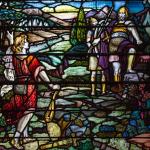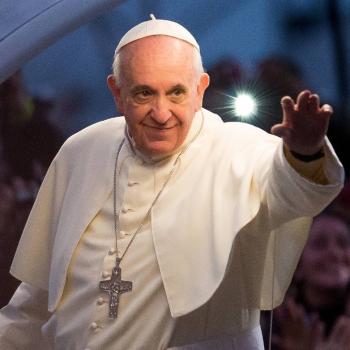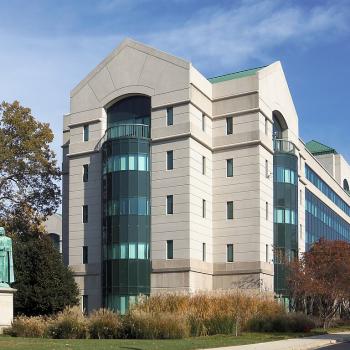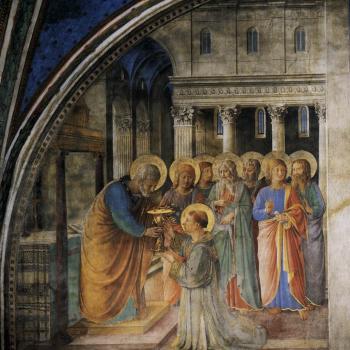
It is vital for society not to confuse extreme radicals who use religion as a tool to promote their own ideologies as being representatives of the religions they claim to adhere. Many of them might admit this, that is, they might admit that they are religious but hold ideas which are not to be confused with the teachings of their religious faith, but others want such confusion to be had, as they want their religious faith to be transformed so as to conform to their ideology. When they do this, they try to defend themselves against criticism by implying those who challenge them are attacking their religious faith and should be treated as bigots.
Radical ideologies need to be criticized when they are being treated as being univocal with a particular religious faith when they do not; those who criticize such ideologies should not be seen as attacking religion, but rather, serving to defend it from misrepresentation. Those who are trying to manipulate and change the faith to represent their ideological perspective, on the other hand, tend to make such attacks.
In the United States, we find many extreme right-wing ideologues trying to confuse the public as to what Catholicism teaches; they indicate that their political ideologies represent normative Catholic teachings, even though if one looks at what they say, and what official Catholic teaching presents, the two are in sharp contrast. For example, we find many in the right embracing nationalism and are rather spiteful to those Catholic teaching says we should defend, such as the poor or foreigners who seek our aid. Such ideologues cannot stand criticism, and when they receive it, act like they are being persecuted for their faith, when what is rejected has nothing to do with Catholic teachings. We can see this playing out in the reaction to Harrison Butker’s commencement speech at Benedictine College.
Many, including the Sisters of St. Scholastica, who helped found Benedictine College, have said Butker’s speech stands in stark contrast to the principles by which the college was founded. They wanted it to be made clear that what he said did not represent the tradition of that college, let alone Catholicism. And yet, there are many who are suggesting that Butker said and did nothing wrong, that what he said authentically represented Catholic teaching, and as such, criticism of him represents anticatholicism; we find this being suggested by those attached to various American right-wing ideologies within Catholic circles, but also in the secular sphere.
If people paid attention to his speech, he is actually rejecting Catholic teachings. For example, when he said, “We fear speaking truth, because now, unfortunately, truth is in the minority. Congress just passed a bill where stating something as basic as the biblical teaching of who killed Jesus could land you in jail,” the implication is that the “Biblical truth” is that “the Jews” killed Jesus and anyone who suggested this could now be jailed. While this misrepresents the bill itself, which has some issues which people can raise about it, the principle behind it is good: we should not use generalizations to promote bigotry against Jews, as that leads to terrible abuse against the Jews. Catholic teaching is clear: claims indicating that the Jews should be viewed as guilty of Christ’s death are to be outright rejected, even as other similar generalizations used to promote antisemitism, and abuse against the Jews, must be repudiated, as Nostra Aetate states
True, the Jewish authorities and those who followed their lead pressed for the death of Christ; still, what happened in His passion cannot be charged against all the Jews, without distinction, then alive, nor against the Jews of today. Although the Church is the new people of God, the Jews should not be presented as rejected or accursed by God, as if this followed from the Holy Scriptures. All should see to it, then, that in catechetical work or in the preaching of the word of God they do not teach anything that does not conform to the truth of the Gospel and the spirit of Christ.
Furthermore, in her rejection of every persecution against any man, the Church, mindful of the patrimony she shares with the Jews and moved not by political reasons but by the Gospel’s spiritual love, decries hatred, persecutions, displays of anti-Semitism, directed against Jews at any time and by anyone. [1]
Next, Butker’s implication that the so-called “Traditional Latin Mass” represents the order and form of worship God wants is itself indicative of the ideological perspective he holds, one which is in stark contrast with Catholicism:
I attend the TLM because I believe, just as the God of the Old Testament was pretty particular in how he wanted to be worshipped, the same holds true for us today. It is through the TLM that I encountered order, and began to pursue it in my own life. Aside from the TLM itself, too many of our sacred traditions have been relegated to things of the past, when in my parish, things such as ember days, days when we fast and pray for vocations and for our priests, are still adhered to. The TLM is so essential that I would challenge each of you to pick a place to move where it is readily available.
Butker is suggesting that there can and should be no change in liturgical practice, that what must be followed, what God wants, is what was found in the Tridentine liturgical tradition; this position has no historical basis for it, as it is clear, liturgy is in constant flux and changing, and whenever someone challenged such changes to the liturgy before, they were told the church has authority to make them. Certainly, everyone can have a stylistic preference, but they must understand, Catholicism does not reduce itself to their preference. By suggesting the church has regulated its sacred teachings to the past itself represents a dangerous narrative concerning tradition, even as it can be seen as a subtle form of anticatholicism, as this ideology is often used by schismatics to try to replace the church with themselves. Tradition is living, and constantly reforming; we must not assume what was done in the past is good for us today, let alone, was good when it was done in the past.
It appears that Butker wants to impose the way things were done in the past, or worse, how he believes they were done in the past, on those living in the present. This is especially clear when we read what he said in relation to women and their dignity. His notion of society is patriarchal, saying that men, not women, should dictate what society is to be like. Women, he says, should consider being homemakers as their highest honor and most representative of their dignity, that what makes them valuable is having children. While such a life can be good, and is something some women find satisfying, this is not true for every woman, and should not be emphasized in a way to make it appear all other options are inferior. Women should find the way of life which is most appropriate for them as a person. We should not promote a one size fits all approach to femininity; there are many callings women can have, not just that of homemaker; certainly no woman, even those called for such a life, should be told it is only when they live it out that their life has truly begun:
I want to speak directly to you briefly because I think it is you, the women, who have had the most diabolical lies told to you. How many of you are sitting here now about to cross this stage and are thinking about all the promotions and titles you are going to get in your career? Some of you may go on to lead successful careers in the world, but I would venture to guess that the majority of you are most excited about your marriage and the children you will bring into this world.
I can tell you that my beautiful wife, Isabelle, would be the first to say that her life truly started when she began living her vocation as a wife and as a mother.
It is ironic to hear this at a religious college, where celibacy is deemed holy and acceptable, and not something to be shunned. Having children is not what makes someone a man or a woman. Being a housewife is not the only thing which can make a woman’s life valuable. It can be a part of it, especially if they choose such a life for themselves, but women should be encouraged to consider all their options, to realize they can and should have a part in society and its formation, making the world a better place with careers, with political activities, or, even the consecrated religious life. Whatever women chose to do, we must recognize all they do from when they are born to the time they die, contributes to who and what they are and their dignity:
The Church gives thanks for all the manifestations of the feminine “genius” which have appeared in the course of history, in the midst of all peoples and nations; she gives thanks for all the charisms which the Holy Spirit distributes to women in the history of the People of God, for all the victories which she owes to their faith, hope and charity: she gives thanks for all the fruits of feminine holiness.[2]
We cannot and must not limit the feminine genius, even as we must not limit masculinity. What we must reject is a patriarchal, toxic masculinity taking over society once again, an ideology which undermines the value of women as it says only men should hold positions of authority and power. This, however, appears to be what Butker promotes:
As men, we set the tone of the culture, and when that is absent, disorder, dysfunction, and chaos set in. This absence of men in the home is what plays a large role in the violence we see all around the nation. Other countries do not have nearly the same absentee father rates as we find here in the U.S., and a correlation could be made in their drastically lower violence rates, as well.
Be unapologetic in your masculinity, fighting against the cultural emasculation of men. Do hard things. Never settle for what is easy. You might have a talent that you don’t necessarily enjoy, but if it glorifies God, maybe you should lean into that over something that you might think suits you better.
Men do not have exclusive control over the culture, nor should they. Catholic teaching certainly does not suggest they do. Men and women are equal with equal gifts. “For it is not possible that in the spiritual gifts there should be any difference of sex, since in Christ Jesus there is neither man nor woman [cf. Gal 3:28], but we should all be one in him.”[3] The equality of men and women is an important teaching. If we follow it, we know both men and women should have a say in society and its formation. Promoting equality does not emasculate men, however, reducing masculinity to only one concept of the masculine does so, as it rejects the great potential found in men. Men staying at home, taking care of children, instead of their wives, are not emasculated. Having men listen to women and encouraging them and promoting them is not emasculating them, rather, it frees them, as they are able to form better relationships with women and work together to form society instead of having everything rest on their shoulders.
Butker’s words concerning COVID, likewise, demonstrate an ideological position, one which is not only in stark contrast to Catholic praxis, but is actively attacking it. Through them, we can see that he is not standing for Christian principles, but rather, the reverse:
As we saw during the pandemic, too many bishops were not leaders at all. They were motivated by fear, fear of being sued, fear of being removed, fear of being disliked. They showed by their actions, intentional or unintentional, that the sacraments don’t actually matter.
Historically, Catholicism has treated pandemics seriously; it was not unknown during them, or other crises, for officials to dispense Catholics from obligations, and indeed, to close churches for the safety of everyone involved. Doing so did not say sacraments do not matter. Rather, it said sacraments must always be engaged in the fullness of Catholic discipline, and that discipline includes charity. Such charity suggests we look to the welfare of everyone, which is what the church did, while those who objected to this wanted to partake of the sacraments in an unworthy manner, as they wanted to selfishly assume they could and should take them as they wish, no matter the consequences to others. And, as was indicated during the pandemic, the graces of the sacraments could still be received without partaking of the sacraments, so that none of the faithful should have felt abandoned by God or the church.
Jesus warned us against being religious hypocrites, trying to get the limelight, pretending to be holy and pious, pretending to be something which we are not, in order to gain fame or power:
Beware of practicing your piety before men in order to be seen by them; for then you will have no reward from your Father who is in heaven. Thus, when you give alms, sound no trumpet before you, as the hypocrites do in the synagogues and in the streets, that they may be praised by men. Truly, I say to you, they have received their reward. But when you give alms, do not let your left hand know what your right hand is doing, so that your alms may be in secret; and your Father who sees in secret will reward you (Matt. 6:1-4 RSV).
Promoting ideologies as being Catholic, when they stand against Catholic teaching, is dishonest; those who go in front of crowds, promoting such dishonesty, represent the kind of pious hypocrisy Jesus spoke against:
That righteousness, however, which is hypocrisy is not righteousness: it is deceptive to the eye, it is false in appearance, it mocks those who see it, it lies to those who hear it, it seduces the crowds, it leads people astray, it sells its reputation, it buys applause, it is done for the world, not for God; it grabs recompence in the present, it does not look for any reward in the future; blind itself it blinds eyes; without sight itself it desires to be seen. [4]
Rejecting this hypocrisy and the falsehoods found in Butker’s speech, is not anticatholic, nor antichristian, but rather, the opposite. Butker, and those who stand with him and back him, are trying to undermine the Catholic faith and supplant it with their own antichristian ideologies. They want people to confuse their political agenda with orthodoxy and orthopraxis; they will often use elements of the truth to do so, suggesting, through those elements, they represent the fullness of the truth and so their critics must be the ones who do not. It is a trick which is used time and time throughout history, as those who stand against Christian orthodoxy have always employed elements of the truth to promote their position and claim orthodoxy got it wrong. They want to change the church from within, to have their ideologies promoted as orthodox, so that they can then kick out anyone who does not follow their political ideologies. Catholics need to respond to that distortion of the faith, and explain not only how anticatholic it is, but also show that when it is the kind of ideology represented by Butker, it is anticatholic because it is antisemitic and misogynistic.
[1] Nostra Aetate. Vatican translation. ¶4.
[2] Pope St. John Paul II, Mulieris Dignitate. Vatican translation. ¶31.
[3] St. Jerome, Commentary on Isaiah in St Jerome: Commentary on Isaiah; Origen Homilies 1-9 on Isaiah. Trans. Thomas P. Scheck (New York: Paulist Press, 2015), 712.
[4] St. Peter Chrysologus, Selected Sermons. Volume 2. Trans. William B Palardy (Washington, DC: CUA Press, 2004),48 [Sermon 9].
Stay in touch! Like A Little Bit of Nothing on Facebook.
If you liked what you read, please consider sharing it with your friends and family!
N.B.: While I read comments to moderate them, I rarely respond to them. If I don’t respond to your comment directly, don’t assume I am unthankful for it. I appreciate it. But I want readers to feel free to ask questions, and hopefully, dialogue with each other. I have shared what I wanted to say, though some responses will get a brief reply by me, or, if I find it interesting and something I can engage fully, as the foundation for another post. I have had many posts inspired or improved upon thanks to my readers.

















